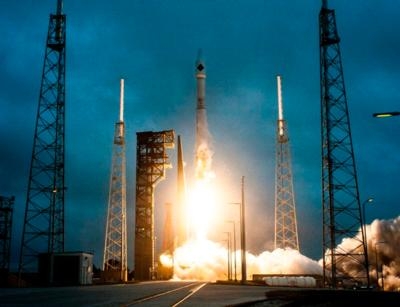Wed, Apr 19, 2017
Research Could Uncover New Information About Accelerated Aging In Space
Julian Rubinfien (16), winner of the Genes in Space competition and a junior at Stuyvesant High School, NY, launched his DNA experiments to the International Space Station (ISS) April 18th from Kennedy Space Center, FL, on cargo resupply mission OA-7. The experiments will be carried out using miniPCR technology aboard the ISS.

Julian's experiments investigate the genetic underpinnings of accelerated aging in space. The first experiment will test if telomeric DNA can be copied in space. Telomeres are protective caps on the ends of chromosomes and are known to shorten in response to stress and aging. Recently, the NASA one-year mission twin study found that Astronaut Scott Kelly's telomeres lengthened during his year in space. Julian's experiment will examine how measuring telomeres in space could enable health monitoring of astronauts during long-term missions.
The second experiment will test whether or not "on-the-spot" DNA-based diagnostic tests can be conducted on the ISS and will be the first of its kind in space. The work will make use of a new colorimetric LAMP (loop-mediated isothermal amplification) method from New England Biolabs to copy and detect specific DNA sequences. Detection of these sequences results in a change in the color of the experimental mixture.
Both experiments will use portable miniPCR DNA analysis technology. The ISS National Lab is a platform for cutting edge research and technology development that enables future deep space exploration. Julian was a student of MƒA Master Teacher Jessica Quenzer, who served as his mentor throughout the Genes in Space application process.
Genes in Space is a national STEM contest that challenges students in grades seven through 12 to design DNA analysis experiments using the ISS National Lab (managed by the Center for the Advancement of Science in Space, or CASIS.) The competition is a partnership between miniPCR, Math for America, CASIS, New England Biolabs, Inc, Boeing and is sponsored by FedEx.
(Source: Genes In Space news release. Image from file)
More News
Aero Linx: Model Aeronautical Association of Australia MAAA clubs are about fun flying, camaraderie and community. For over 75 years, the MAAA has been Australia’s largest fl>[...]
Touchdown Zone Lighting Two rows of transverse light bars located symmetrically about the runway centerline normally at 100 foot intervals. The basic system extends 3,000 feet alon>[...]
“Discovery and innovation are central to our mission at Virgin Galactic. We’re excited to build on our successful record of facilitating scientific experiments in subor>[...]
How To Get A Story On Aero-TV News/Feature Programming How do I submit a story idea or lead to Aero-TV? If you would like to submit a story idea or lead, please contact Jim Campbel>[...]
Student Pilot Reported That During Rotation, “All Of A Sudden The Back Of The Plane Kicked To The Right..." Analysis: The student pilot reported that during rotation, “>[...]
 ANN's Daily Aero-Linx (05.02.24)
ANN's Daily Aero-Linx (05.02.24) ANN's Daily Aero-Term (05.02.24): Touchdown Zone Lighting
ANN's Daily Aero-Term (05.02.24): Touchdown Zone Lighting Aero-News: Quote of the Day (05.02.24)
Aero-News: Quote of the Day (05.02.24) ANN FAQ: Contributing To Aero-TV
ANN FAQ: Contributing To Aero-TV NTSB Final Report: Cirrus Design Corp SR20
NTSB Final Report: Cirrus Design Corp SR20



